'Make no mistake, depriving water deliberately to a nation of 190 million people is a repugnant idea.'
'The world community won't forgive us,' warns Ambassador M K Bhadrakumar.
 Yashwant Sinha, dissident par excellence in the Bharatiya Janata Party, seldom misses an opportunity to embarrass the Narendra Modi government.
Yashwant Sinha, dissident par excellence in the Bharatiya Janata Party, seldom misses an opportunity to embarrass the Narendra Modi government.
And the fact of the matter is that he not only has an erudite mind and is articulate, but also has the wit to spot the Achilles heel of our besieged prime minister at any given time.
Sinha, unsurprisingly, takes the most hawkish position conceivable on how India ought to retaliate against Pakistan over the attack on army base in Uri. His opinion piece in the Indian Express two days ago espousing 'jaw-for-tooth' will delight the RSS and Hindu nationalist constituency but hits Modi where it hurts, who is, of course, in the unhappy position of being accountable for his fateful decisions, some of which can even cause the loss of a million innocent Indian lives.
Amongst Sinha's hard-hitting suggestions to teach Pakistan a lesson, he suggests:
While the military response is being worked out, the government should:
- abrogate the Indus Waters Treaty with Pakistan with immediate effect.
- Treaty terms are observed between friends, not enemies. Pakistan is an enemy State of India.
- India will, therefore, be fully justified in abrogating the Indus Waters Treaty with Pakistan.
To be sure, having been India's external affairs minister, Sinha isn't unaware why South Block never pursued such a bright idea to 'punish' Pakistan.
But our 'hawks' of the Sangh Parivar with their tunnel vision may not know that although the Indus Waters Treaty is, strictly speaking, a bilateral covenant, it was negotiated behind the scenes by a third party -- the United States -- which even today takes pride that the covenant survived the ravages of time in the subsequent tortuous 55-year history of our subcontinent, since it was signed in Karachi in 1960.
The sharing of waters between India and Pakistan was an idea that originally occured to a brilliant American mind, David Eli Lilienthal, who once headed the Tennessee Valley Authority in the US (which was created by President Franklin Delano Roosevelt during the Great Depression for comprehensive development of the Tennessee Valley, especially for creating jobs through public investment).
Suffice it to say, the Indus Waters Treaty showcased the US' commitment to assist the modernisation of agrarian societies.
Lilienthal also had a strange weakness for our impoverished subcontinent whose acute problems of poverty somehow obsessed him. He later recounted in his journal: 'India and Pakistan were on the verge of war over Kashmir. There seemed to be no possibility of negotiating this issue until tensions abated. One way to reduce hostility... would be to concentrate on other important issues where cooperation was possible.'
'Progress in these areas would promote a sense of community between the two nations which might, in time, lead to a Kashmir settlement.'
'Accordingly, I proposed that India and Pakistan work out a program jointly to develop and jointly to operate the Indus Basin river system, upon which both nations were dependent for irrigation water.'
'With new dams and irrigation canals, the Indus and its tributaries could be made to yield the additional water each country needed for increased food production... I had suggested that the World Bank might use its good offices to bring the parties to agreement, and help in the financing of an Indus Development programme.'
What a beautiful mind Lilienthal had! American pundits flag the 1960 Treaty as a golden moment vindicating that international mediation can actually work in resolving India-Pakistan issues.
To be sure, Modi cannot but be aware that he can find no better way of causing annoyance to 'Friend Barack' (who is, by the way, a staunch believer in America's exceptionalism) than by erasing the finest moment in the chronicle of the untiring US mediatory efforts through several decades to navigate India-Pakistan relations away from the brink of war to cold peace.
Simply put, it is a no-go area for the Modi government, which is wedded to the bandwagon with the US in Asia. This is one thing.
Second, do the ilk of Sinha realise what impact such an act on our part will create in the minds of the international community?
Do they really want Modi to be compared with Kim Jong-un, who, according to a newspaper with close ties to the Chinese Communist Party, once stripped naked his powerful uncle who fell out of favour, threw him into a cage to be eaten alive by a pack of ravenous dogs?
Make no mistake, depriving water deliberately to a nation of 190 million people is a repugnant idea. It sucks. The world community won't forgive us.
Besides, what would India's small neighbours think?
A maverick country arouses negative feelings.
How could Sri Lanka be sure that India would not abrogate the Kachativu Agreement?
How far can Bangladesh be complacent that the land boundary agreements with India are the last word?
Third, importantly, as the Bible says, 'Do unto others as you would have them do unto you.' If we do this to Pakistan, we also forfeit our claim to expect or demand from China similar prerogatives, as Pakistan has enjoyed under the Indus Waters Treaty.
Simply put, India will be creating a bad precedent. And, that will be exceedingly foolish, considering our very heavy dependence on waters flowing into our Hindi heartland from rivers that originate in Tibet.
Above all, our folks do not realise that this entire repugnant discourse has a moral dimension to it. We seem to be no more cognisant that once upon a time we belonged to a culture, where, according to the Bhagavata Purana, Kuchela gave away the beaten rice to Krishna, and the Lord savoured every grain.










